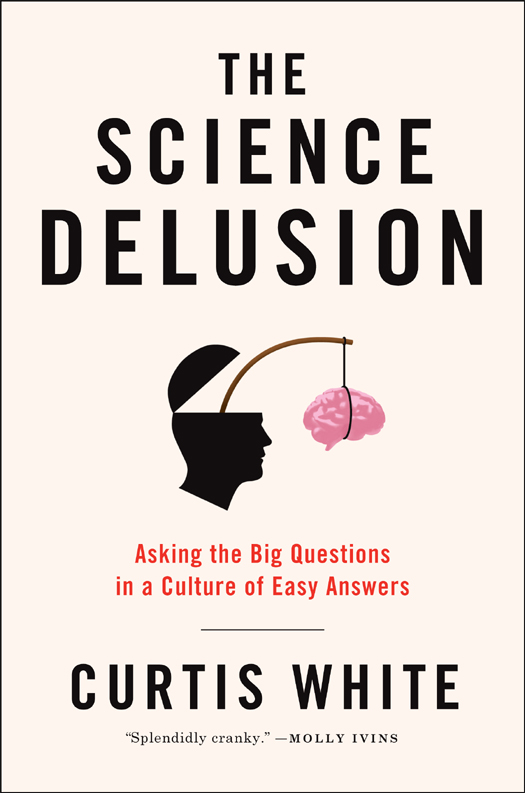
The Science Delusion
Asking the Big Questions in a Culture of Easy Answers
کتاب های مرتبط
- اطلاعات
- نقد و بررسی
- دیدگاه کاربران
نقد و بررسی

June 3, 2013
Novelist and critic White (The Middle Mind) outlines his concerns about reductionist "scientism" that seeks to explain the human mind as a machine at the expense of a great philosophical tradition. It's a hit-or-miss polemic that's as erudite in its explications of Romantic German Idealism as it is woeful in its grasp of contemporary biology or cognitive science. He rightfully takes Stephen Hawking and Lawrence Krauss to task for their assertions that "philosophy is dead", and laments Official Science's classism and collusion with state and corporate power. Other deserved targets of White's ire include Jonah Lehrer, Sebastian Seung, and TED's Rand-ian "Silicon Valley politics". Unfortunately, White doesn't separate the scientific process from its practitioners (particularly with regard to morality) and levels ad-hominem attacks at Richard Dawkins instead of critiquing him on his scientific work. Nevertheless, his secular solution to the problem of corporatist science's sanitizing of creativity and counterculture is an embrace of Romanticism, and he advises looking to the teachings of philosophers like Friedrich Schelling and scientists like Morse Peckham and Jacob Bronowski for "what science is mostly clueless about: how we ought to live." Though slightly off-target, White's argument is worth consideration and his delivery passionate and humorously bitter.

May 15, 2013
White (English/Illinois State Univ.; Barbaric Heart: Faith, Money, and the Crisis of Nature, 2009 etc.) disputes the triumphalism of neuroscientists, evolutionary psychologists and geneticists who proclaim "the victory of science and reason over religion." The author pays particular attention to the writings of Jonah Lehrer, Richard Dawkins and the late Christopher Hitchens, all self-professed atheists whom White charges with having encroached on the "domain of philosophy, the arts, and humanities." As an impassioned social critic, he does not endorse the fundamentalist Christian attack on science, and he argues against what he calls scientism, exemplified by Dawkins' contention that the human mind, social behavior and morality can be explained as the working of selfish genes or their cultural counterpart, memes. Without a "collaboration with art," he writes, "science is doomed to moral sterility, or to a nihilism that asserts that there are no values." White goes a step further, charging that this "ideology of sciences meshes with the broader ideology of capitalism" by treating self-interest as primary. He skewers Hitchens as a representative of privilege and entitlement who basked in his sense of cultural superiority and found a convenient scapegoat for unjust wars in the gullibility of religious believers. White also objects to Lehrer's explanation of the role of a brain scan in showing creativity--by showing areas of the brain that are activated when a subject solves a puzzle, creativity is illuminated. This implicitly equates the creativity of Beethoven or Bob Dylan with that of the inventor of Swiffer mops, without regard to the content of their thought or the broader "social context" in which it occurred. While not denying the fascinating advances of modern science, the author stresses the importance of philosophy and other disciplines. A witty critique of scientific overreach that celebrates the totality of human achievement.
COPYRIGHT(2013) Kirkus Reviews, ALL RIGHTS RESERVED.

June 15, 2013
Social critic and novelist White (English, Illinois State Univ.; The Middle Mind: Why Americans Don't Think for Themselves) is itching for a fight. He calls out religious fundamentalists and especially the "neo-atheists" (e.g., Richard Dawkins, Christopher Hitchens) for claiming knowledge beyond their expertise. And scientists, e.g., Carl Sagan and Stephen Hawking, he says, have no right to speak about beauty or claim awe at what they see because they haven't thought such concepts through and can't possibly grasp them. Their "scientism" holds that we are all simply biological machines with no purpose. However, White believes that "the poorly understood tradition of Romanticism" is where purpose, art, and beauty are given their due. To reinforce his arguments, White quotes most prominently the 19th-century German philosopher Friedrich Schelling, while adding, ."..is Schelling's philosophy difficult? Yes, I suppose so...." Many reading the book will agree. VERDICT White makes a passionate case for the Romanticist view that recognizes mysteries inexplicable through science and without pinning them to the actions of a god. With some broad generalizations and extensive use of challenging quotes from philosophers he admires, White's book requires readers to be ready to put in some serious intellectual effort.--Richard Maxwell, Porter Adventist Hosp. Lib., Denver
Copyright 2013 Library Journal, LLC Used with permission.

























دیدگاه کاربران